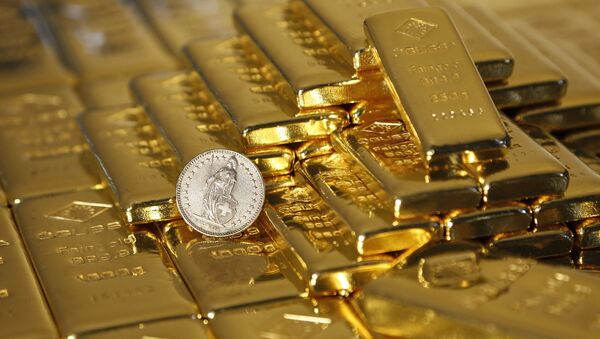MOSCOW, December 4 (Sputnik) — Russia’s Central bank has demonstrated an increased scale of gold-buying this year, triggering diverse speculations both in the media and the expert community on whether it is a simple measure of supporting the price for the domestically produced metal, or part of a complex strategy in the economic standoff with the developed world. This way or another, there are voices suggesting its high time for Russia to introduce a gold exchange rate for the nation’s currency amid the prolonged ruble’s plunge in order to boost living standards, consumer demand and spur manufacturing sector.
Russia’s authorities have stated multiple times that one of their monetary objectives is to reduce dependence on the US dollar for its foreign trade. The recent depreciation of ruble by roughly 40% against the dollar has leveraged a heavy burden on Russia’s private sector, as its dollar-denominated debt amounts at $678.40 bln, according to Trading Economics’ data. One of the way of getting rid of the dollar for Russia is trading in local currencies with its partners, which it practices to some extent with China. However, as evidenced by the recent developments, this has not helped much.
The implementation of the gold standard, according to Macleod, will allow for curbing the consume inflation (amounting at 11.5% year-on-year in food prices at this point). Lower inflation will spur investment. The gold exchange rate will also change Russia’s relationships with other nations. The implementation of gold standard in Russia will challenge the fundamentals of the current system of global monetary management and mark a partial return to the norms of the Bretton Woods system, effectively reversing the consequences of the Nixon shock.
However, one would have hard time finding a nation, fiscally sound enough for the gold standard. China, being a good match at first sight, guarantees all of the indebtedness of its provincial governments, which amount at $1,8 trln in mid-2013, according to the Economist. Businessweek reported this January China’s debt of provinces, counties and townships amounted at $2.96 trln. Russia’s corporate debt exceeds its total amount of foreign reserves, meaning a default on the debt will bee required before the implementation of the gold standard. However, such measure would invoke disastrous implications for the economy, far outweighing the benefits of the peg to gold. India and Brazil have $376 bln and $428.3 bln in international debt, respectively. Of all the nations the gold standard would be perfectly appropriate for only a few nations, among which are Republic of China in Taiwan, Singapore, Macau and Liechtenstein, free of external debt burden.




